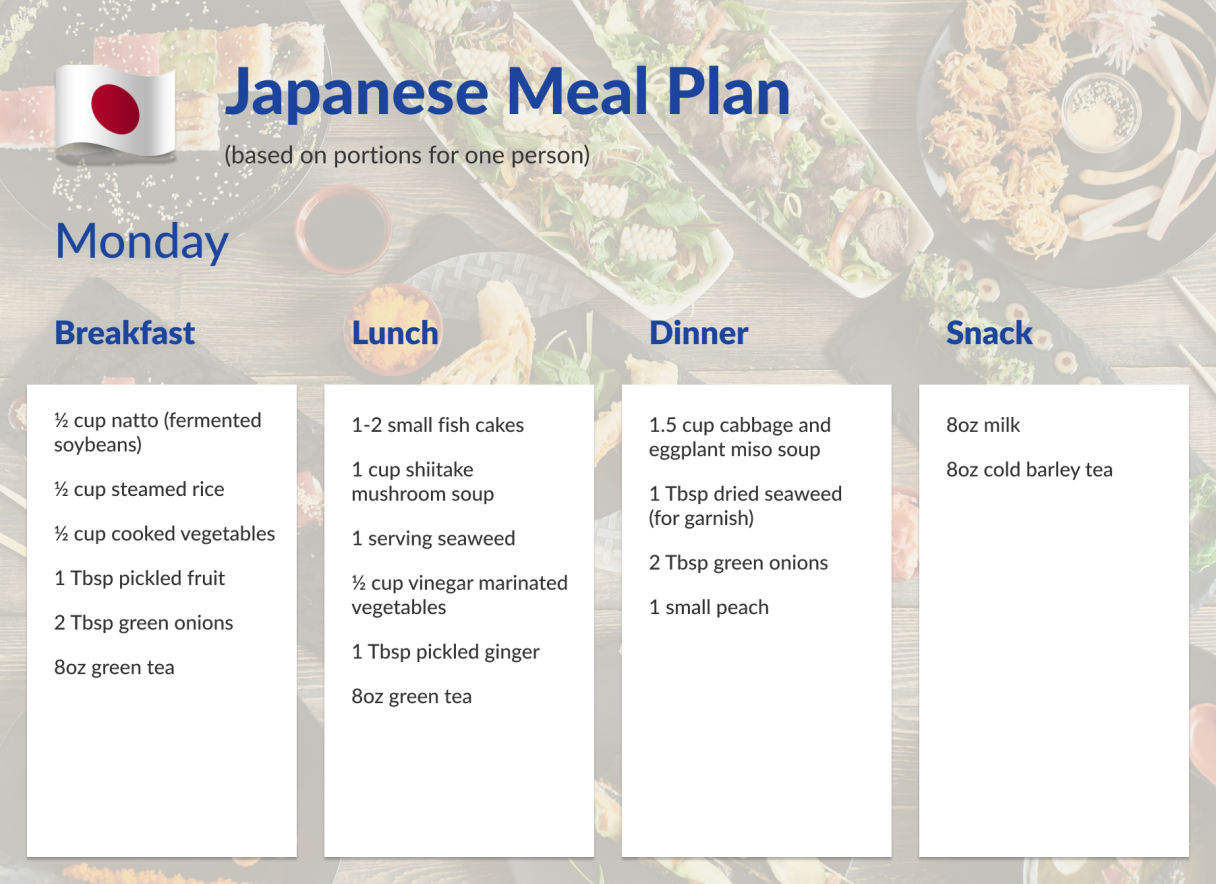
Meal Plan Created By: Amanda Kostro Miller
Known for its subtle flavors and rich “umami” taste, Japanese cuisine is as beautiful as it is healthy. The country has one of the longest life expectancies in the world, and the traditional Japanese diet and culture surrounding food play a big role in the population’s health outcomes.1 To help you experience the benefits of Japanese cuisine, we’re breaking down the top health benefits of this diet and giving you a free, weeklong Japanese meal plan created by a Registered Dietician.
Download The Printable Meal Plan
Health Benefits of Japanese Food
Encourages Healthy Digestion
Many staples of the Japanese diet, including seaweed, soybeans, fruits, and vegetables, are naturally rich in soluble and insoluble fiber. Insoluble fiber is important for reducing the risk of constipation, while soluble fiber supports the good bacteria in your gut.2 3 In addition, many Japanese dishes call for pickled fruits and vegetables, which serve as a source of probiotics. When eaten as part of a balanced diet, probiotics can support gut health and reduce issues like bloating, gas, constipation, and diarrhea.4 5 6
Supports A Healthy Weight
Traditional Japanese cuisine is naturally low in sugar and fat, high in vegetables, and is often served in small portion sizes, which are all factors that contribute to a lower daily calorie intake. In addition, Japanese culture encourages “hara hachi bu,” a term that means “eat until you’re 80% full.” This approach can help deter overeating because it instructs you to stop eating when you’re satisfied, not overstuffed.7 In addition to healthy eating habits, the food itself can help you attain or maintain a healthy weight. The cuisine’s fiber-rich components, like soups, soy, and vegetables, may play a role in reducing appetite and boosting feelings of fullness.8 9 10
May Promote Heart Health
Traditional Japanese cuisine is rich in foods that offer some protection against heart disease, including seaweed, green tea, fruits, vegetables, and soy.11 12 13 14 15 A 2017 study shows that following a Japanese diet could decrease risk factors for cardiovascular disease, and a long-term study published in 2016 demonstrated that closer adherence to Japanese dietary guidelines was associated with a decreased risk of cardiovascular disease-related death.16 17
Healthy Japanese Recipes

To experience a wide range of Japanese dishes, download our free, 7-day meal plan. Try your hand at making your own ramen dish, experimenting with traditional miso soup, and testing out well-known dishes like spring rolls, sushi, and sashimi. Designed to fuel your body and delight your taste buds, you may just find yourself repeating the meal plan again and again!
References
1 https://pubmed.ncbi.nlm.nih.gov/31560029/
2 https://pubmed.ncbi.nlm.nih.gov/23326148/
3 https://www.ncbi.nlm.nih.gov/pmc/articles/PMC5390821/
4 https://pubmed.ncbi.nlm.nih.gov/23981066/
5 https://pubmed.ncbi.nlm.nih.gov/19091823/
6 https://pubmed.ncbi.nlm.nih.gov/19220890/
7 https://health.clevelandclinic.org/dont-eat-until-youre-full-instead-mind-your-hara-hachi-bu-point/#:~:text=Hara%20hachi%20bu%20is%20a,a%20fairly%20long%20life%20expectancy
8 https://pubmed.ncbi.nlm.nih.gov/23885994/
9 https://pubmed.ncbi.nlm.nih.gov/21185976/
10 https://pubmed.ncbi.nlm.nih.gov/23093339/
11 https://www.ncbi.nlm.nih.gov/pmc/articles/PMC5400241/
12 https://pubmed.ncbi.nlm.nih.gov/17317693/
13 https://pubmed.ncbi.nlm.nih.gov/21685707/
14 https://pubmed.ncbi.nlm.nih.gov/26318390/
15 https://pubmed.ncbi.nlm.nih.gov/27927636/
16 https://www.ncbi.nlm.nih.gov/pmc/articles/PMC5392477/
17 https://www.ncbi.nlm.nih.gov/pmc/articles/PMC4804125/












